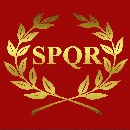 In Snowcrash, Neal Stephenson posits a future where traditional nation-states have been superceded by FOQNEs: Franchise-Organized Quasi-National Entities. In this vision of shattered sovereignty, each bite-sized chunk of real-estate (called a ‘franchulate’) is the legal territory of its corporate parent, governed by its laws, and one may become a ‘citizen’ by paying appropriate membership fees.
In Snowcrash, Neal Stephenson posits a future where traditional nation-states have been superceded by FOQNEs: Franchise-Organized Quasi-National Entities. In this vision of shattered sovereignty, each bite-sized chunk of real-estate (called a ‘franchulate’) is the legal territory of its corporate parent, governed by its laws, and one may become a ‘citizen’ by paying appropriate membership fees.
FOQNEs were brought to mind when I did some research on Nova Roma this past week. I’m more than passingly familiar with historical recreation groups, having had an intermittent association with the Society for Creative Anachronism for the past twelve years or so. Nova Roma seems to be of the same ilk, focusing its efforts, as one might deduce, on classical Rome. Even so, the following passage on their wiki took me somewhat aback:
Nova Roma is more than a historical recreation society, although we are that. We are more than a pagan religious organization, although we are that, too. We are more than a classical studies group, but that falls within our purview as well. We are nothing less than a sovereign nation; an attempt to re-create the best of classical pagan Rome (with a few compromises to modern times), and we invite you to join us by applying for citizenship today.
Surely, you’re saying to yourself, they can’t be serious. They’ve anticipated this reaction, and address your skepticism in their FAQ:
Are you serious about the sovereignty thing?
Yes, we are completely serious about our declaration of sovereignty. However, we are also very realistic and do not expect to function as an actual sovereign nation with our own territory in the foreseeable future. We look at it in three ways; as a long-term goal towards which we can reach, as a very convenient way to organize the administration of Nova Roma (especially given our Roman orientation), and as necessary for the full and complete restoration of the Religio Romana (since many religious duties were inherently tied to the State).
The SCA, while half-jokingly claiming to maintain the world’s largest private army and organizing itself via an elaborate system of kingdoms, baronies, shires, and so on, to the best of my knowledge has never claimed to be an independent nation. How are we to understand ‘sovereignty’ in this sense?
In fact, there is a curiously vigorous stream of semi-secessionist movements of varying degrees of seriousness. Perhaps the best introduction to their variety is this Angelfire page on micronations, which groups these efforts into a taxonomy that includes self-proclaimed states (Sealand is the most famous of these), sedition and exile groups (including the impressively straight-faced Neue Slowenische Kunst movement), new country projects (Nova Roma is categorized here), United States tribal groups, model countries (including the SCA), and actual small countries (I retain a soft spot for the S.M.O.M.). The exuberant florescence reminds me very much of the panoply of constructed human languages, from Lojban to Esperanto to Klingon to Eaiea to DiLingo.
I’ll admit to some curiosity. Nova Roma doesn’t appear to have a strong Pennsylvanian base, but there does seem to be an active New York contingent. One of these days I’ll play the traveler and make the trek to the City for my chronicles. Perhaps they know more than they’re letting on: after all, ‘the Empire never ended’.
[Image of Shinjuku Loglo courtesy KinkiMcG. Image of a recreation of a classical Roman festival courtesy Livia Drvsilla.]

3 replies on “Roma Revivens”
More to the point, shouldn’t it be Roma Nova? One finds oneself hesitating to swear unwavering fealty to a God-Emperor who APPEARS to have serious trouble with his adjectives.
Thanks for the comment, Z.D. They’re theoretically republican, so perhaps they need an emperor to save them from themselves?
Actually, though, either order is correct. While most adjectives tend to follow their nouns, certain classes (mostly abstract concepts such as truth, beauty, quantity, etc.) typically precede. My own Latin knowledge is insufficient to say whether nova falls in this class, but in any case the order can be switched up for emphasis. Placing an adjective before its noun emphasizes the adjective (and if we allow poetic license, anything goes). Here’s a reference on typical word order from Wikipedia and another on moving adjectives around from D’Ooge’s Latin for Beginners.
“Nova” often comes first: Nova Zembla, Nova Scotia, Nova Troia, etc.